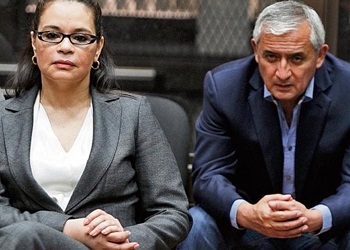A recent report has suggested that Guatemala’s incarcerated former president and vice president continue to wield power from behind bars over a year after their fall from grace, casting fresh doubt on whether this monumental case has achieved any lasting successes against impunity.
Analysts consulted by Guatemalan news outlet La Hora affirm that imprisoned former Guatemalan President Otto Pérez Molina and former Vice President Roxana Baldetti continue to exert power within the criminal structures they helped set up. Both public officials resigned and were detained in 2015, following revelations that they were leading a customs fraud network named “La Línea.”
SEE ALSO: InDepth on Prisons
Since then, the government has seized various assets belonging to the pair, including bank accounts and real estate.
However, political experts point out that both Pérez Molina and Baldetti could maintain control over assets that remain undetected. La Hora’s report also suggests that the power of the two former officials goes beyond their economic clout.
“Power has to do with money, but also with…the ability to exert influence,” independent political analyst Renzo Rosal told La Hora. In the case of Pérez Molina and Baldetti “this capacity has been affected or damaged, but it has not been totally lost,” he added.
One of the starkest displays of this power involves the purchase of the former president’s seized assets. The company Canyon Group, which made a bid to buy a huge quantity of avocados from a farm seized from Pérez Molina, apparently has ties to other businesses implicated in an illegal campaign financing and government contracting network dubbed “Cooptación del Estado.” Rosal told La Hora that this case demonstrates how Pérez Molina maintains control over front companies in an attempt to recover illegal assets of his which have been seized.
The report also draws attention to the recent transfer of nine inmates out of the Mariscal Zavala military detention center, which seemingly laid bare the presence of criminal networks inside the facility. According to sources consulted by La Prensa Gráfica at the time, the transfers broke up a power structure led by Pérez Molina and fellow inmate Gustavo Alejos — a former government official also implicated in the Cooptación del Estado case — who were apparently issuing orders to people close to them via telephone.
Nevertheless, Alejos, who had been among those transferred out of Mariscal Zavala, returned to the prison only days later. According to analysts cited by La Hora, this perplexing decision is an example of the ongoing co-option of the judicial system by corrupt elites.
InSight Crime Analysis
That Pérez Molina and Baldetti could be pulling the strings of their criminal networks from behind prison walls is not hard to fathom given the proven abilities of Guatemalan elites to co-opt state institutions. Despite the progress in the country’s justice system over the past year, this is yet another hint that hopes of a “Guatemalan spring” may still be out of reach.
SEE ALSO: Investigation: Guatemala Elites and Organized Crime
Guatemala’s prison system is notoriously corrupt, providing space for powerful figures such as the former president and vice president to use both money and political influence to their advantage. Indeed, shortly after his incarceration, news emerged that Pérez Molina was enjoying luxurious conditions in his former cell at the military facility Matamoros.
His current situation may not be very different. As political analyst Edgar Gutiérrez explained to InSight Crime, “in Guatemala they call Mariscal Zavala the VIP prison because of the luxuries and privileges given to the inmates, and also because the majority of former top-ranking government officials and businessmen facing corruption charges are held there.”
“Pérez Molina ‘gives orders’ from his apartment-jail…and maintains good relations with judges, congressmen and advisors to current President Jimmy Morales” — people who have tried to lobby in the selection of the Congress president and of court magistrates, according to Gutiérrez.
Experts agree that as a former military official, it is easier for Pérez Molina to exchange favors with his former peers as long as he continues to be held in army bases. What’s more, Pérez Molina had a longstanding relationship with the “king” of Guatemala’s prison system — convict Byron Lima, who was assassinated in jail in July 2016 — stemming back from their time in the armed forces together.
The cases of Pérez Molina and Baldetti also illustrate how efforts to tackle criminal structures in Guatemala may have simply led to their re-accommodation rather than their dissolution. As long as corrupt structures maintain power within state institutions, there are worries that Guatemala’s recent achievements against impunity — largely spearheaded by the United Nations-backed Commission Against Impunity in Guatemala (Comisión Internacional Contra la Impunidad en Guatemala – CICIG) — will not result in long-term improvements to the status quo. In a recent statement, CICIG Commissioner Iván Velásquez alluded to the fragility of the institution’s successes, and the ongoing possibility that they may be reversed.
“This doesn’t detract from the merit nor the impact of the Public Ministry [Ministerio Público] and the CICIG,” Gutiérrez added. “But they are quite simply operating on a system that has not seen reforms in norms, internal processes, or been purged of its staff.”

